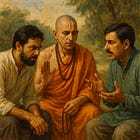Senior devotees acting improperly: The ugly cases
Cases of misbehavior and bad examples are one thing. What to do in serious cases, where a leader is caught doing immoral or even criminal activities, abuses his position to exploit and manipulate?
This is the continuation of the previous article: What to do when senior devotees don’t act properly?
Cases of misbehavior and bad examples are one thing. What to do in serious cases, where a leader is caught doing immoral or even criminal activities, abuses his position to exploit and manipulate, while using his influence to cover such acts?
The first point is to try to assess the real extent of what happened. Many situations are described online in exaggerated ways, making them appear much worse than they actually are. A case of consensual sex can be described almost like rape, and the words “child abuse” can mean many other things apart from the first meaning that comes to mind.
It’s also important to make the distinction between fall-downs and cases of abuse and exploitation. A fall fits into the definition of human weakness. One may have an extra-marital affair, a sannyāsī may become involved with a lady, and so on. Cases like these are usually not premeditated, and although they prove that one is not fully transcendental, it does not necessarily imply that a devotee is not seriously trying.
However, other cases can be characterized as crimes or serious abuses, and even worse, cases where the same individual commits the same type of abuse repeatedly, using different artifices to maintain their position and followers, despite that. Such cases are deeply revolting and can be extraordinarily destructive, but it is essential to distinguish between the group and the individual who abuses the trust of the members of the group. Positions are filled based on trust, but trust can be abused. Often, people who look honest and trustworthy can ascend to positions of leadership, just to later use the same positions to perpetrate and hide crimes.
Unfortunately, criminals and dishonest people have an advantage when it comes to attaining positions of leadership in any kind of group or organization, because they can use any means to achieve such a goal, while honest persons are limited by their ethics. We can observe this in ordinary politics. This allows predators to often abuse the system, especially in spiritual societies, using charisma to create a group of followers and obtain a higher position, and then using different artifices to maintain such a position, even while repeatedly harming others. Cases like that can be very destructive for everyone involved, because they involve not only the breach of trust and the damage to the victims, but also the infighting created by the clash of those who take the side of the victims, and the ones who, because of sentimentality or ignorance of the true facts, take the side of the perpetrator. When everything comes into light, it becomes clear who was wrong, but when things are happening, it is much harder to have a clear view, because people who commit crimes like these are often psychopaths, who are efficient in covering their tracks and manipulating others.
Another problem is that in many cases, what happens is not sufficient for the case to be treated like a criminal case. Many times, the actions committed don’t classify it as such (a leader having sex with a follower will normally be legally classified as consensual sex, for example), because there is not enough proof to start a criminal case, or because the victims choose not to report the case. As a result, it ends up being dealt with internally as a disciplinary case. This has two limitations: the first is that a group of devotees elected to deal with a case like this doesn’t have the power of police. They can remove people from their positions, or maybe ban them from the community, but anything beyond that is frequently beyond their powers. Another problem is that devotees have a soft heart, and often are too lenient even inside of this framework, which infuriates the victims and others.
It should, however, be understood that there is a universal system of justice from which no one can escape. Religious movements and communities often have little defense against psychopaths and predators infiltrating, because members tend to trust each other, and follow leaders out of sentiment, and thus perpetrators can not only abuse the system to attain positions of leadership, but also to cover their tracks, manipulate others, and make it difficult to face punishment. This, however, does not mean they will go unpunished. In any case, the punishment one could face in a civil or criminal court is very mild compared to what a predator may face in hell for what he did.
The greatest danger in such cases, however, is not even the harm directly caused, but the collateral damage to the faith of others, which can affect thousands of people. A predator being able to climb into a leadership role and cover his tracks may lead many to conclude that the whole group or institution must be equally corrupt, or that the process itself doesn’t work. Here, it is important to distinguish between these three components: the process itself, that is eternal, the group or institution, which is composed of human beings, and thus inherently imperfect, and the individual criminal, who abused the system.
Part of the problem comes from considering the group or institution as perfect, something that it was never meant to be. Although a spiritual society is generally safer than it would be otherwise, it doesn’t mean it is completely safe, nor that it is impervious to the actions of bad elements. We thus need to be always attentive, especially when vulnerable persons are involved. and not just trust that leaders will provide us with safety. Not only are they also human, but they are often already distracted with other duties.
Why is there abuse in our society if this is Krsna’s movement?
Another dimension of this question is how our society can have so many problems, including cases of abuse and other serious issues. We hear that this is a spiritual society, Mahāprabhu’s movement, etc., and we can ask ourselves how such things can happen in Krsna’s own house.
One way to see it is that when we offer some preparation to Krsna, He always gives us back something better than what was offered. There is always a spiritual quality and special taste added to the food. However, Krsna’s reciprocation depends on how much care and devotion we put into the offering, and — except in cases of special mercy — it will not alter the basic properties of the food. If we offer rice, it will not come back as rasagullās. If it is burned, it will come back burned. If it is without salt, it will come back without salt.
The basic principle of spiritual life is that we try to offer something nice to Krsna, the best we can, and not to demand things from Him. The way to establish a relationship is always to give, and not to demand. Krsna, of course, knows that, and He waits until we are ready to relate to Him in good terms. Many see God as an order supplier, someone who should satisfy all their desires in exchange for some official worship. Krsna can also reciprocate with them to a certain extent to reinforce their faith, but He will not accept to fulfill all their whims.
One example that can be given in this connection is the pastime of the demigods approaching Lord Viṣnu after being defeated by Vṛtrāsura. The demigods didn’t ask Lord Viṣnu for advice before killing Viśvarūpa, their spiritual master, and when Vṛtrāsura appeared as a result, they went to the Lord asking Him to appear as an incarnation to solve the problem they themselves created. The Lord still reciprocated, giving them knowledge of how to manufacture the thunderbolt weapon from the bones of Dadhīci, but He didn’t accept doing the dirty work for them.
Similarly, all sorts of problems appear in our society due to contamination introduced by us. Even an abusive leader can maintain a position only if supported by a group of sentimental followers. It could be a perfect society if everyone would perfectly perform all their duties, but because we fail in doing so, being lapse in following the instructions of Prabhupada and other representatives of the Lord, problems appear.
There is a certain way to make sweet rice or any other nice preparation, which requires securing quality ingredients, good cooking utensils, etc., cooking it properly, giving it time to cool, and so on. If we do everything properly, we will offer nice, sweet rice to Krsna, and we will get nice prasādam back. If, however, we offer some burned preparation made from adulterated milk, we will get the same back.
The same principle applies to everything. Because the basic principle of our society is devotional service to Krsna, there is always a special spiritual quality present, but the basic form will still be of what we offer. A house will not become bigger because we make it a temple, nor will it be miraculously restored by magic. All the black spots in the painting will still be there, just as the broken ceiling and the damaged doors. The spiritual quality will be there, but the basic physical form will not change. Similarly, when we create a community, a school, or anything else, the basic form will still be of what we put there. Krsna may accept our offering, no matter how flawed it may be, but still, what we will receive back as a result will not be different in essence from what we offered.
Schools, for example, have always been an area neglected in our movement. Often, the worst people, who would not be useful for anything else, were put as teachers; the schools would not be properly funded and not properly supervised. Managers would not give it the proper attention, seeing it more like a headache than anything else, and the parents would also not supervise it closely, thinking that they were doing enough by just paying the fees. The school would often be put out of view in some building in the back, and everyone would prefer to look the other way. Then, when problems would appear, everyone would be surprised.
Of course, the teachers or managers who were in charge and let things happen are responsible, but all others who saw the mismanagement and the problems growing and failed to take proper action, also share part of the burden, and all of us, as a society, are partially responsible for it, directly or indirectly.
Seeing things from the perspective of offering something to Krsna can be empowering, helping us to understand that we have a role to play in the development of a spiritual society, getting out of the position of mere spectators. We can’t solve everything, but there is always some positive role we can play if we are humble and introspective enough.
Even if we are not in the platform of organizing things well out of pure devotion to Krsna, we can at least try to understand and perform our duties properly for our own sake and for the sake of our dependents. We can connect with other devotees, or even with pious people from the outside, to help organize things properly and offer something pleasing to Krsna. When we do so, good results come back.
The whole Bhagavad-gītā is based on this premise. The position of Arjuna as a devotee of the Lord was never in question, but when he was faced with a difficult situation, his immediate reaction was to take the easy path, running from the problem. However, because he approached Krsna to ask what to do, Krsna had the opportunity to give him the knowledge that allowed him to achieve the best outcome.
Had Arjuna just run like he originally intended, the results would be very different, as explained by Krsna in the second chapter of the Gītā. Similarly, when we face perplexing situations or when things appear to be out of our control, if instead of just neglecting the situation, we come to Krsna or His representative to get instructions, we can get the knowledge of how to properly act. Applying this knowledge will then be our battle of Kurukṣetra, which will allow us to fulfill our duties and act properly, creating something nice that can be offered to Krsna.
What struggles do you face in your spiritual life? Post in the comments below ⤵️
Read also:






Hare Krishna Prabhu ji 🙏 Thank you for addressing this article, but prabhu one question I also saw that in temples those who are in higher authority when they see that a particular devotee is advancing rapidly or preaching and gaining followers then the management put false allegations or ruin their character in temple community, how to look into it ? And how to deal with that?
How do we address abuses or mismanagement that we see when we are junior to someone? I have also heard that it can be a offense to point out someone's mistake or when something is going wrong. But then if we never say anything, aren't we just perpetuating the problem? And if we want to offer something sweet to Krsna, shouldn't we also endeavor to make this society as sweet and successful as possible? Or do we just do our duty in service and remain distant from true intimate relationships with devotees in the name of keeping the peace and not making offenses?